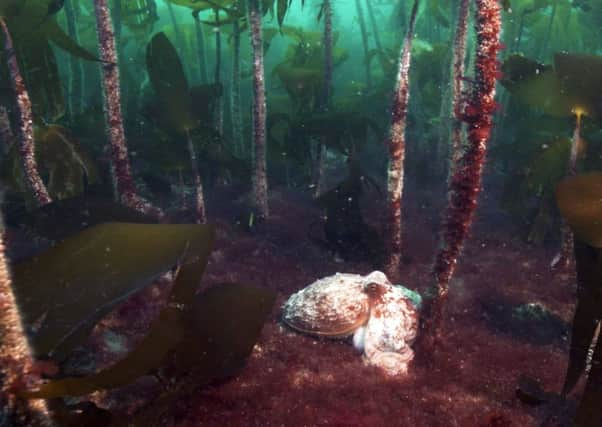Kelp forests must be saved and here's why '“ Alexander McCall Smith


Some years ago a small group of uninhabited islands to the north of Coll came on to the market. The Cairns of Coll are so small that you have to look quite hard for them on the map, but there they are, some of them not much more than an expanse of rock raised up from the surrounding sea. The largest island is about 50 acres, a low hill that discloses signs of ancient occupation but is now home only to seabirds and, at its edges, colonies of seals. On one, the most northerly, a small Stevenson lighthouse sits, powered by solar energy, dutifully sending out its warning to passing vessels.
You can beach a boat here on one of the slopes of pure white sand. You can explore the low saliences that afford a view of the Hebridean Sea to the west, of Rhum, Muck and Eigg to the north, and of the high ramparts of Skye beyond. With exception of the lighthouse, nowhere are the works of man to be seen. There is a beauty here that is beyond price in a world where such places are becoming more and more sullied by the pressure of human population – and by the relentless human desire for more of everything.
Advertisement
Hide AdAdvertisement
Hide AdI was in the fortunate position of being able to buy these islands from the person in Barra who was selling them. Her family had looked after them for years and now she wanted to hand them over. I have no plans to do anything with them – they are to remain pristine, a natural reserve in a world that is increasingly being covered in concrete or stripped of its plants. They will be there for those who can get to them – most often, people going out on whale watching or nature cruises – or for sailors who are able to go ashore and picnic and explore. Divers sometimes land on them and explore the rich seabed around them. I go out there once or twice a year and just stand and breathe in the air and close my eyes, knowing that I am being watched by curious seals, their heads popping up out of the surrounding waters. If anybody really owns these islands, it is those seals.
The marine environment in that part of Scotland is now being threatened by a proposal to license the large-scale commercial harvesting of kelp from the sea-bed. This will involve mechanical removal of kelp forests, essentially stripping them out by their holdfast. The proponents of these schemes say that this can be done only in limited areas and that there will be little overall damage to the seabed and the life systems it sustains. There is weighty evidence from many reputable marine scientists that contradicts this. This technology will destroy the habitat of fish and many other creatures. Our kelp forests should be left untouched – completely. It is no good saying that only a little will be taken; 30,000 tonnes a year – what the scheme proposes to take – is too much. Even 1,000 tonnes a year would be too much for the bit of the sea bed affected.
Opposition to this scheme has come from many quarters. No less a naturalist than David Attenborough, whose credentials in the defence of nature are above question, has joined the clamour of protest. Local communities, including fishermen, have made known their opposition to what is proposed. A petition against the proposal has been signed by thousands of people who live in the area and who have a stake in preserving our precious marine environment frm destruction. The matter is to be voted on at Holyrood today.
Everybody understands that we have to make some use of the sea and that we cannot always leave nature undisturbed. But surely we have to be extremely cautious that any intervention we make in the marine environment is kept to the minimum, and that in particular we should we should avoid industrial activities that will inevitably destroy significant areas of the marine habitat. Kelp can be harvested, but must be cut by hand, on a controlled scale, rather than left to the mercy of marine combine harvesters.
What we lose we cannot always get back. Our poor world is reeling, and as it reels, the metaphors abound. We are now in injury time when it comes to global warming; the nuclear disaster clock is set at a few minutes to midnight. Scotland is a tiny bit of our natural world, but it is a precious and lovely part of it. Holyrood is its steward. Those who sit there must listen to the conservationists and scientists who are trying to get them to hear a simple, urgent message: don’t do this.
I think of the Cairns of Coll. I think of those waters, those hills, those breathtakingly lovely places that make up the world of the Hebridean islands. The underlying eco-system will unquestionably be harmed if large scale harvesting of kelp is allowed. There will be fewer fish. There will be less protection for the shoreline. Little marine deserts will be created. So, little by little, we destroy the things we love and need.
